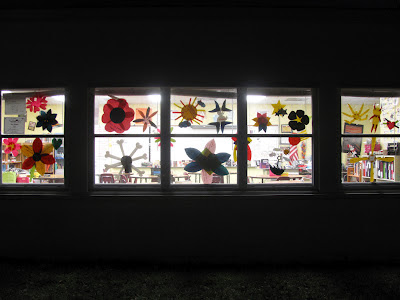 Most people who know me know that my aunt was my fourth grade teacher. For this and many other reasons, fourth grade was an amazing year as a learner for me. It wasn't like the one that I envision for my daughter if I continue to keep her in Florida public schools. I imagine she will spend time preparing for FCAT Writes as well as FCAT reading and math. She is already a writer. She keeps pestering me to set up a blog for her. Yesterday she started working on a post to be a guest writer on my blog. She writes for real reasons, reasons that make sense to an eight-year, notes to friends, posters, a journal, and cards.
Most people who know me know that my aunt was my fourth grade teacher. For this and many other reasons, fourth grade was an amazing year as a learner for me. It wasn't like the one that I envision for my daughter if I continue to keep her in Florida public schools. I imagine she will spend time preparing for FCAT Writes as well as FCAT reading and math. She is already a writer. She keeps pestering me to set up a blog for her. Yesterday she started working on a post to be a guest writer on my blog. She writes for real reasons, reasons that make sense to an eight-year, notes to friends, posters, a journal, and cards. In fourth grade my first piece of writing was published. It was in the local paper, The Clay Today, and it was a letter asking the Iranians to release the American hostages. I don't remember doing a graphic organizer. The planning for that piece may have just been reading about the topic and possibly watching the news. I assume that I also developed background knowledge that summer by living in family housing with my mom in Alumni Village on Pennell Circle at Florida State University. A multi-ethnic community resided there including an Iranian couple who had come to America to go to graduate school. I still can't find any eggrolls or wontons that match the ones sold by a Chinese woman who would come around every evening selling them door-to-door out of her bucket. That summer provided me with enough experience to feed my writing.
 As an adult, I realize that my teacher, Mr. Ritchie, had us write for an authentic purpose and audience. This assignment in 1979 was from a teacher who understood the power of an audience, writing for real people, not just writing for him. It was an assignment that connected students to the real world. I am not sure if my daughter or any other 4th graders will have that experience in this state. I envision many hamburger graphic organizers and formulaic five paragraph responses.
As an adult, I realize that my teacher, Mr. Ritchie, had us write for an authentic purpose and audience. This assignment in 1979 was from a teacher who understood the power of an audience, writing for real people, not just writing for him. It was an assignment that connected students to the real world. I am not sure if my daughter or any other 4th graders will have that experience in this state. I envision many hamburger graphic organizers and formulaic five paragraph responses. These aren't the experiences that shape real writing. As a writing instructor, I see it in the difference between what my ninth graders write for mandatory practice FCAT writing tests and their well-crafted essays emulating writers such as Rick Reilly and Leonard Pitts Jr ala Kelly Gallagher. Their FCAT writing is dead. Their writing with these mentors has power and voice. It is a shame. Hope too is ready to write for real purposes. Students in a digital age have some many opportunities to write for real live world-wide audiences. What a wonderful space for teachers to hook kids into writing just as this slice of life blog has been working for me.



























